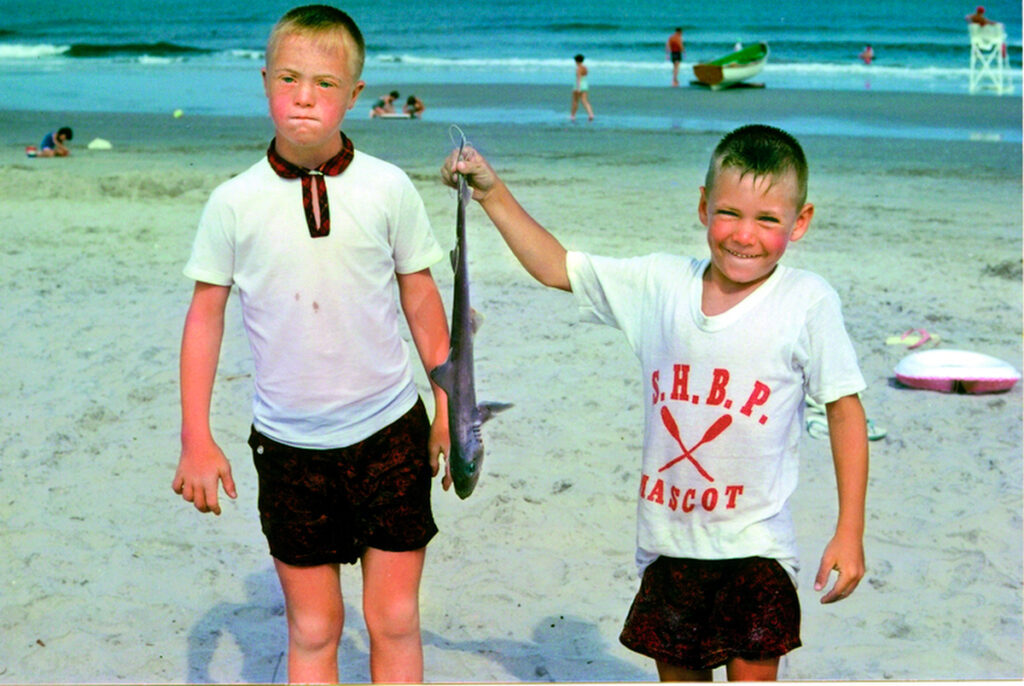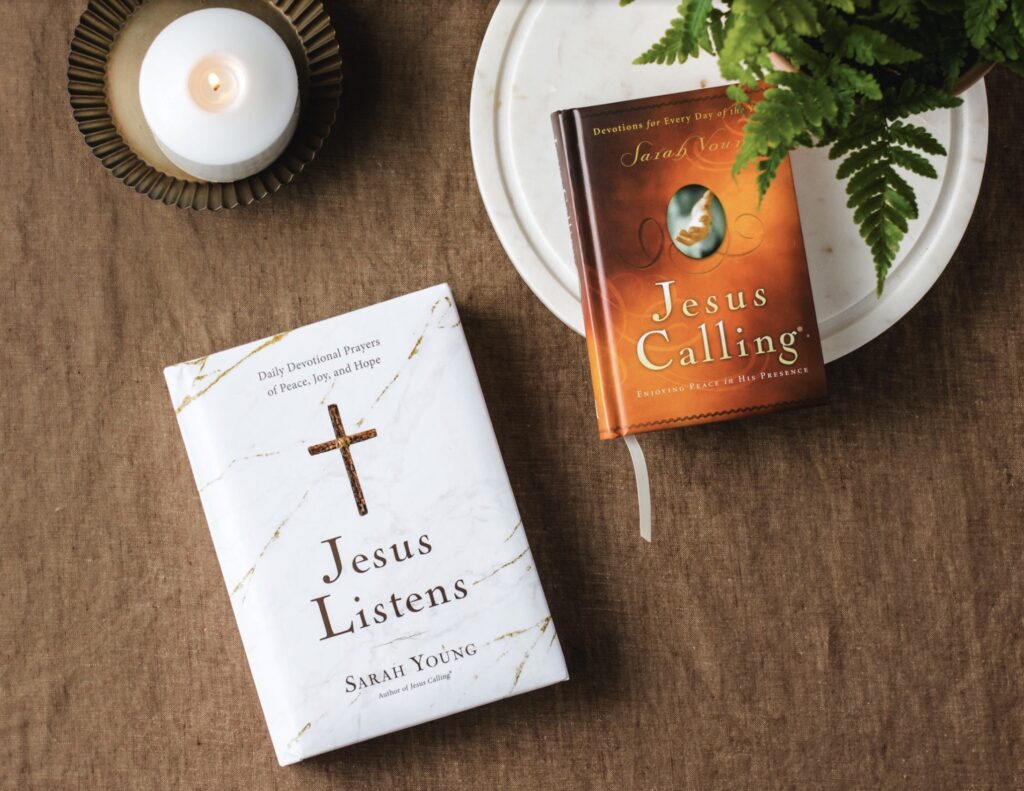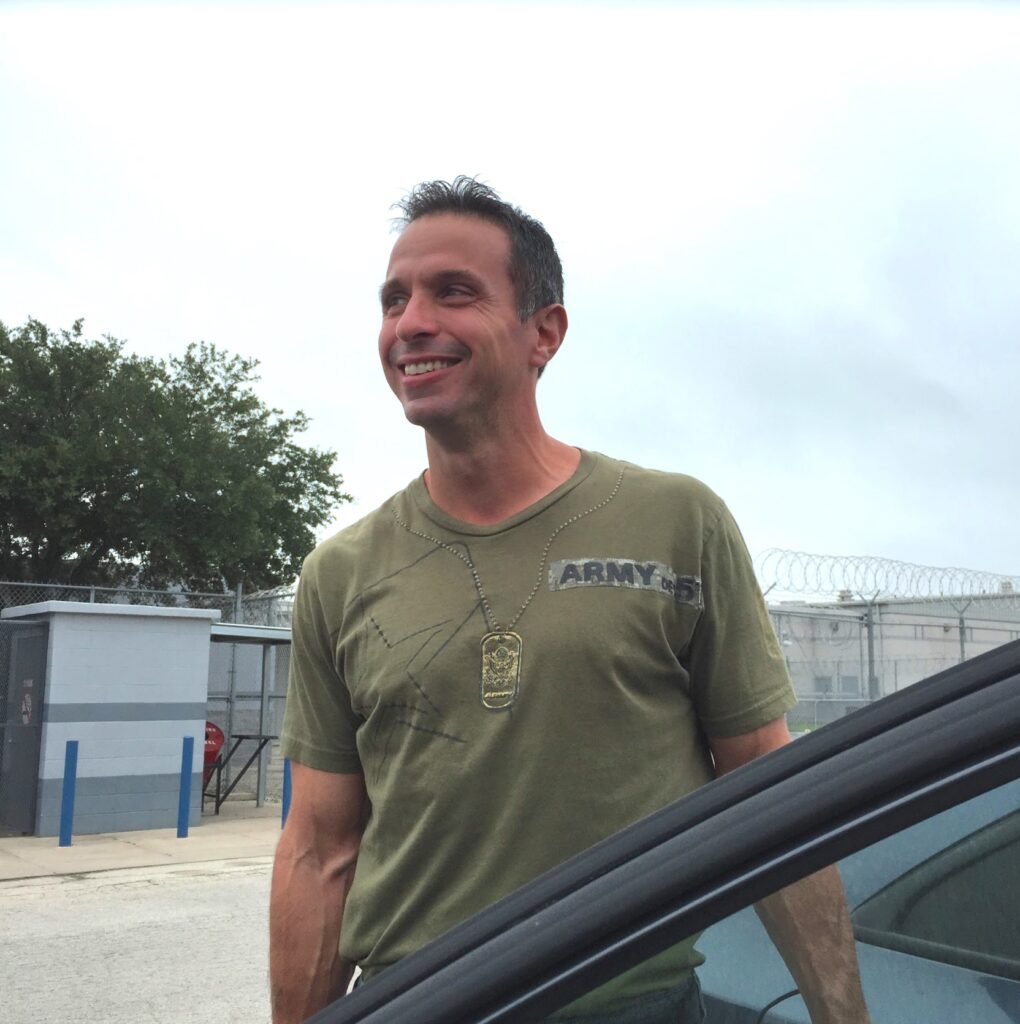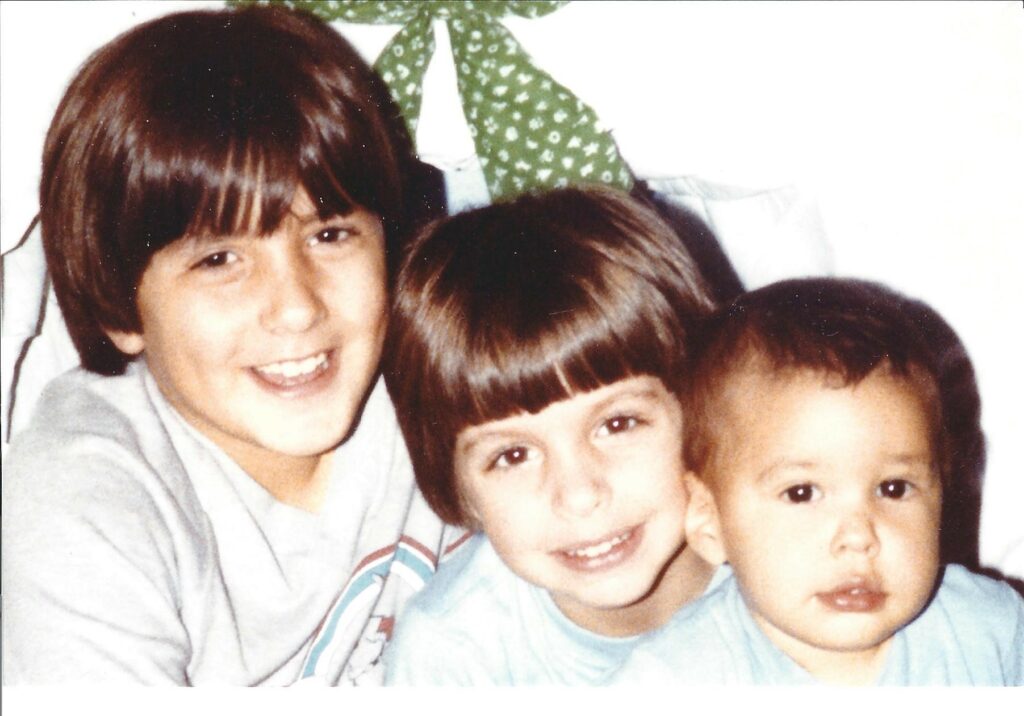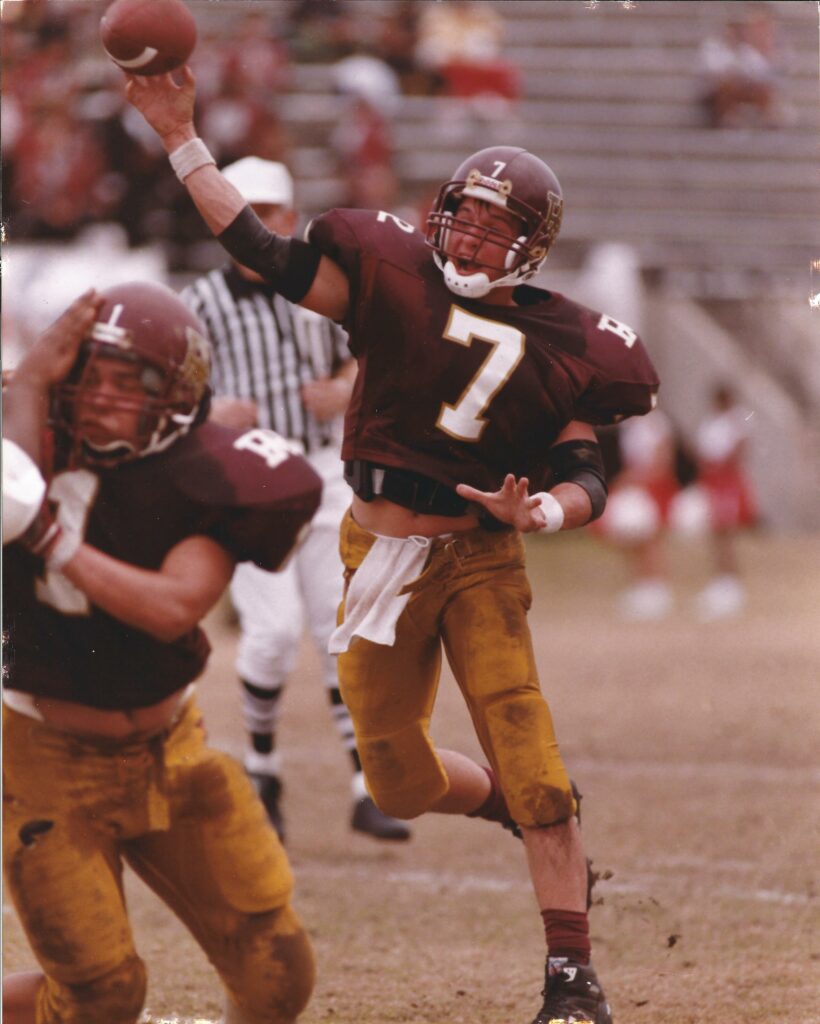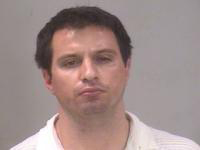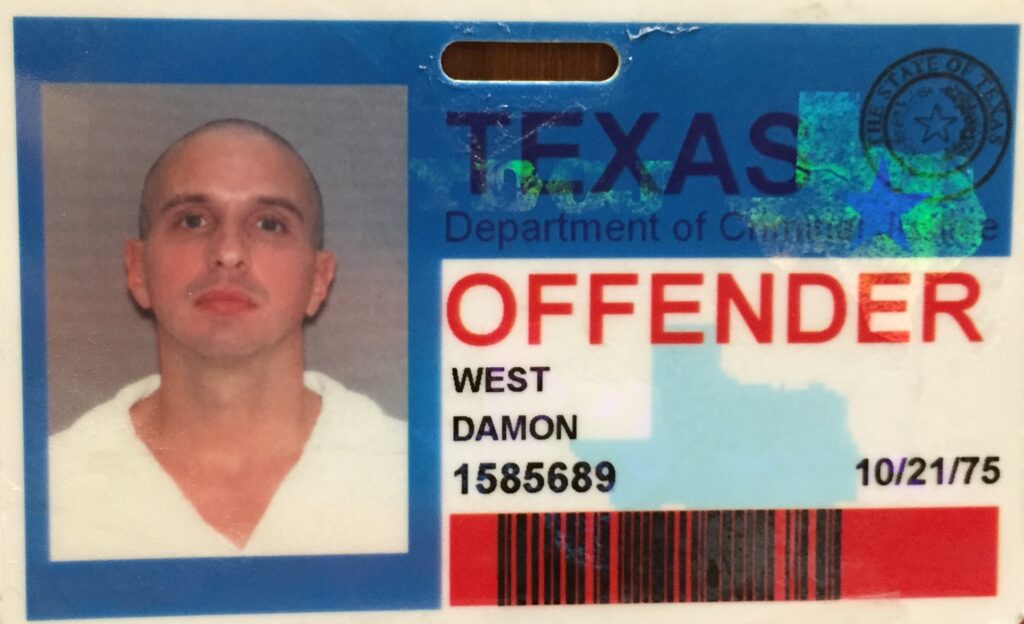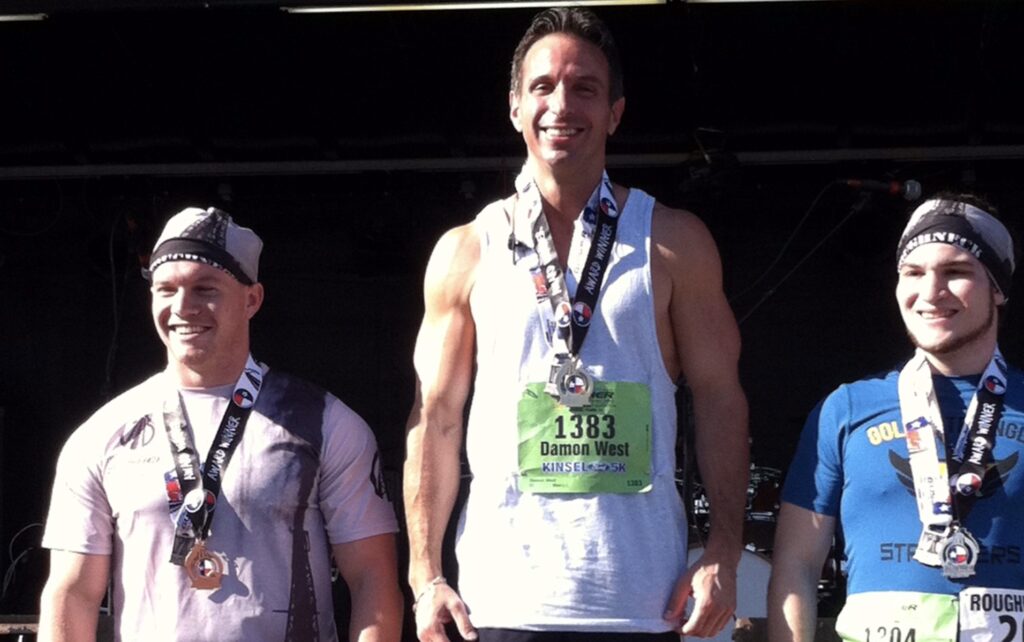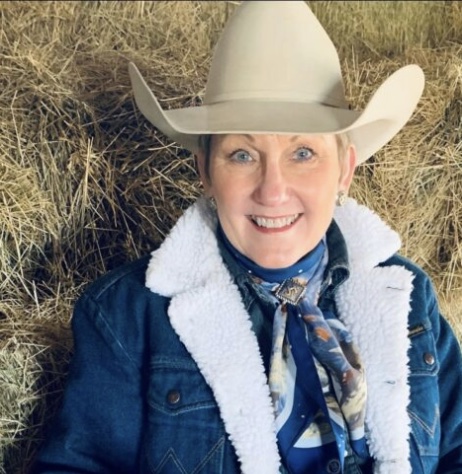God Can Transform Us in Our Darkest Moments: Edward Grinnan & Damon West
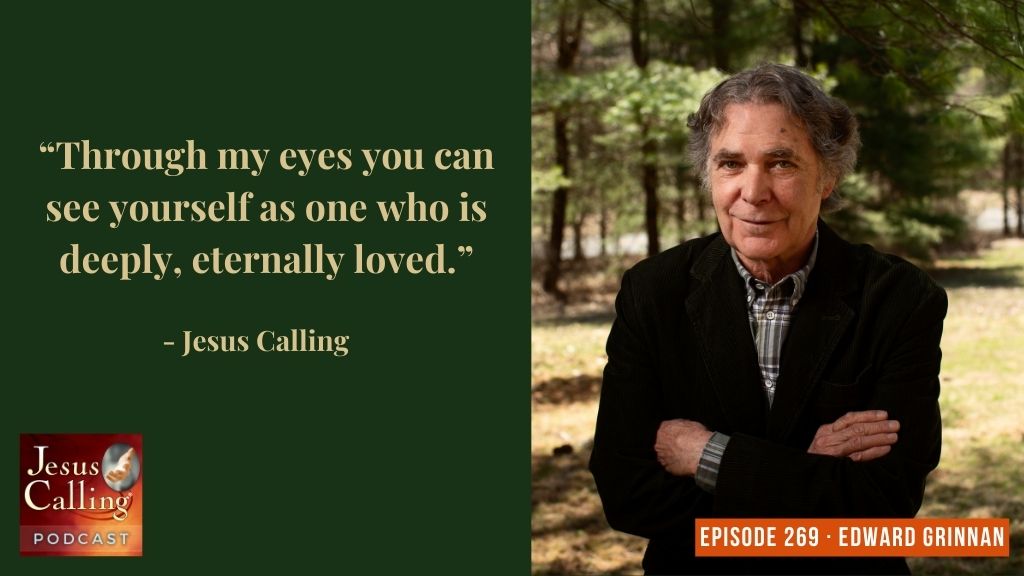
Edward Grinnan: Jesus knew that if you wanted to communicate with His followers—people who were interested in His ministry—He needed to tell them a story, and He told great stories. And you see that in the Gospels and those stories have been passed down and passed down and passed down because that is the engine that engages so many people. Because in stories we see ourselves, we can see our own life unfolding in somebody else’s story and vice versa. And that’s why I think storytelling is so powerful.
God Can Transform Us in Our Darkest Moments: Edward Grinnan & Damon West – Episode #269
Narrator: Welcome to the Jesus Calling Podcast. This week’s guests have both overcome circumstances and obstacles that could have wiped them out completely, but in their darkest moments, they turned to God—and stepped into a life transformed. Joining us this week is editor-in-chief of Guideposts Magazine, Edward Grinnan, and motivational speaker Damon West.
First up, Edward Grinnan grew up in a family bound together in faith—a faith they had to lean on heavily after the tragic loss of his brother, Bobby, who lived with Down Syndrome. In trying to cope with his brother’s death and navigating life as a young adult, Edward turned to alcohol as a source of comfort and found himself addicted—something he would battle for years to come. Just two weeks sober after a stint in rehab, Edward got a call from Guideposts Magazine who offered him a much-needed job—and what he thought would be a temporary position ended up transforming his life and turning into a thirty-year career, which also found him becoming the editor-in-chief of the magazine.
Edward: I’m Edward Grinnan, I’m the editor-in-chief of Guideposts Magazine. I’m the Vice President of Strategic Content Development at Guideposts.
A Family Tragedy
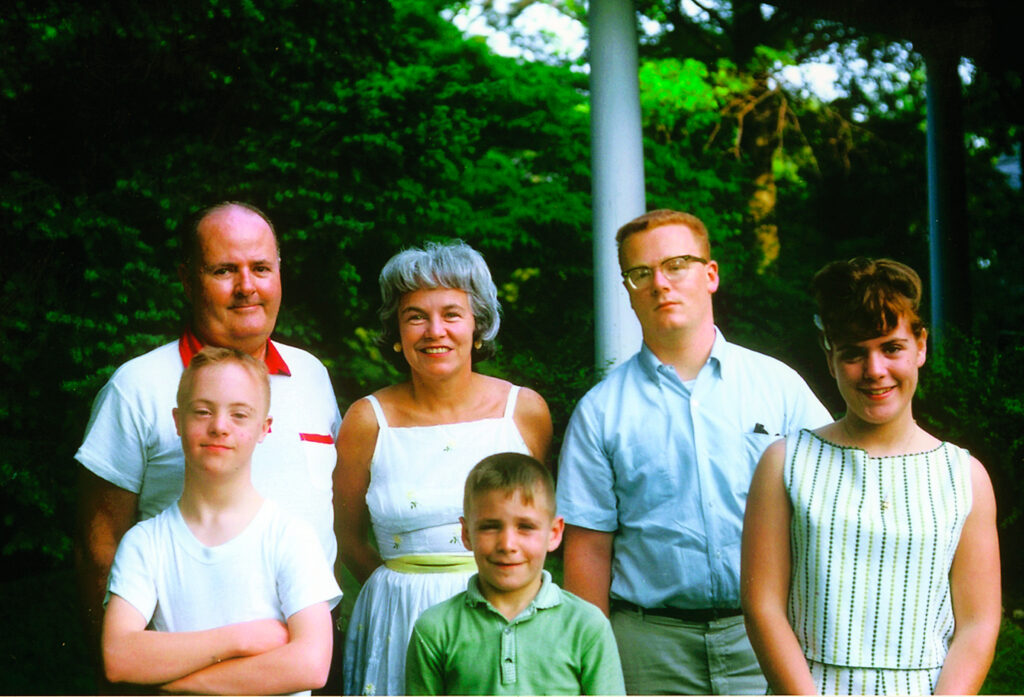
I was born in Philadelphia, actually in a little tiny town on the outskirts of Philadelphia called Havertown, and then we moved out to Michigan. And that was a big deal for us because my family was very much an Eastern family. Everybody was either in Philadelphia or Boston. I was the youngest child, I was born very late in my parents’ lives. I had two older brothers and an older sister. My next oldest brother, Bobby, had Down Syndrome. So that was interesting—I mean, to grow up in that environment where there is an intensive amount of caregiving for that particular child—you know, I think it opened my eyes to the kind of needs that people have for one another.
We were only out in Michigan for about a year, and Bobby disappeared one morning. He was a creature of routine, so it was pretty alarming that they couldn’t find him. I remember being pulled out of school and taken home that day. When I got home, there were TV vans and cameras all over the front yard, and it soon got reported out that a child with Down Syndrome was missing.
There was a lot of speculation as to what happened to Bobby. You know, the days went by and the weeks went by, and the police searched and searched and searched. It was assumed that he was kidnapped. And our family went through a terribly difficult time for four or five weeks. They eventually found my brother’s body floating in the neighborhood lake, a lake that was searched repeatedly in the weeks during his disappearance. They never were able to explain how his body got into that lake, and they were never really able to close the case. But, of course, it had a tremendous, tremendous influence on the family dynamics. It’s hard to trust the world after that.
But I’ll tell you something: I came from a family of very, very strong faith, and when you lose a child, that tends to tear apart marriages. And looking back all these years later, I didn’t really see it as a child, but my parents stayed together. Their marriage was as strong as ever, and that’s because they turned to their faith every single minute of that crisis and every single hour after that crisis.
“When you lose a child, that tends to tear apart marriages . . . but my parents stayed together. Their marriage was as strong as ever, and that’s because they turned to their faith every single minute of that crisis and every single hour after that crisis.” – Edward Grinnan
Alcoholism Takes Root
I was so much younger than my brother and sister. They all went off to college and the military. And as the youngest child I was, I had a lot of freedom.
How did that incipient alcoholism in my life take root? Because that’s really where I was going to dominate my life for the next twenty years or so. I didn’t know it at the time, but I did have an alcoholic grandfather on my father’s side. And when I was about thirteen, out in the woods with a bunch of kids, somebody had stolen a bottle of whiskey from somewhere, and we passed the bottle around. And so I remember tipping that bottle to my lips. You know, it was a full moon, it was an autumn night, and just something about the alcohol coursing through my blood and my brain made me feel like I never felt before. I remember thinking, I want to feel this way all of this time, all the time, and really the next twenty years or so, that’s what I tried to do.
Of course, it worked for a while. I was able to be kind of a wild kid and sort of getting in a certain amount of trouble, but I always made sure that I was in great shape academically.
The alcoholism slowly but surely ate me alive so that by the time I was out of graduate school, my late twenties/early thirties, I was basically a homeless wreck. I was just living on the streets on and off, begging for money just so I could continue drinking. There are lots of things that happened in between, college, jobs, travel, vagabond travel, graduate school, but in the end, life spat me out onto the streets. And that’s where I was by my early thirties.
“The alcoholism slowly but surely ate me alive so that by the time I was out of graduate school, my late twenties/early thirties, I was basically a homeless wreck. I was just living on the streets on and off, begging for money just so I could continue drinking.” – Edward Grinnan
In Denmark, in Copenhagen, I was actually about two and a half years sober. I thought I could drink again, I forgot that I was an alcoholic, and I started to drink and it went desperately, horribly off the rails. I disappeared in Copenhagen. I was there working on a book for a corporation that I was employed by. I was on the twenty-third floor of a hotel, and I sat on the windowsill, one leg dangling over the precipice, and one leg still in the room with a glass of liquor on my stomach. And I said, “You know, I’ll probably pass out, and if I fall out the window that’s fine. And if I fall back into the hotel room, then that’s fine, too.”
I remember waking up in bed with an incredible light shining through the window. It was the middle of the night, and it just blinded me. I sat up and thought, I’m going to be okay. I’m going to be okay.
I came back, I ended up back in New York. My withdrawal from alcohol at that time was very, very serious, and I was walking up Broadway and went into a convulsion and ended up in a detox unit in Manhattan. A few days later, I got out, I went back to my apartment. At that point, I was living with another person who was in the same twelve-step program I was in. We shared the same sponsor, and he pretty much said, “If you start drinking again, you’re out, you’re back on the streets.”
The Chance of a Lifetime
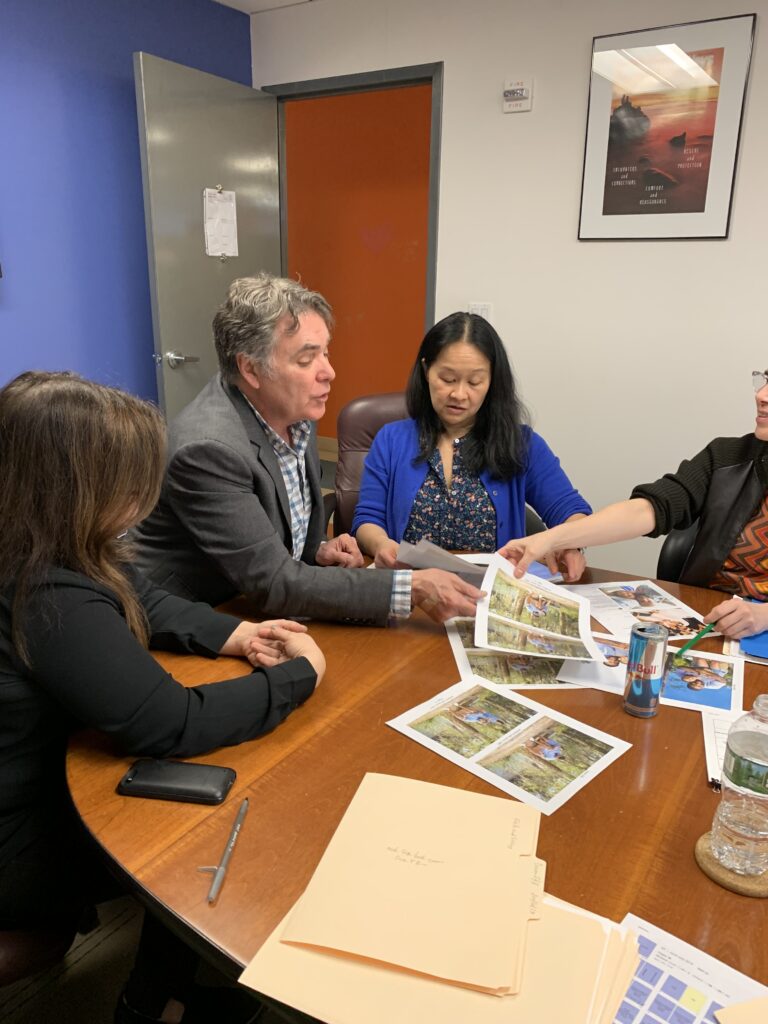
I got a phone call from a recruiter I had never heard of, who had my resume, and I never sent her my resume. I didn’t know who this person was, didn’t know if it was a scam. And they said, “Well, there’s a magazine called Guideposts and they’re looking for an editor. Would you like to go in for an interview?”
I’d never heard of Guideposts. And I thought, Hmm, sounds like a travel magazine. Well, I’ll go in. Maybe I’ll get some free trips out of this. Maybe this is the reward of staying sober for a couple of weeks.
So I went in. My sponsors in my twelve-step program said I needed a job and commit to it for one year. Didn’t matter really what the job was, just commit to something and work on sobriety and work on your relationship with God. I said, “All right,” in my alcoholic brain, “I’ll be out of here in six months and I’ll find a job at The New York Times or I’ll be at Condé Nast and Vanity Fair, I’ll get a job at Esquire. So that was 1986, and I’ve been at Guideposts ever since.
Guideposts was founded seventy-six years ago by Dr. Norman Vincent Peale. He heard so many different stories from people about the challenges they faced in life and how they overcame these challenges, and how they used their faith and positive thinking to help them face life and find joy and fulfillment and satisfaction and a strong faith foundation to their day to day lives. And he thought, Okay, there’s got to be a way to have these people tell their stories of faith in action.
He created this magazine and started publishing stories by everyday people, which was groundbreaking. This was in 1945, right after World War II ended, and people really wanted to be part of the national conversation, a period of tremendous transformation in America and around the world. And that’s what Guideposts is to this day: personal stories of hope and inspiration mostly from everyday people.
We have about 4.5 million readers per issue of the magazine. Our readers tell us that what makes them come back to the magazine issue after issue, year after year, decade after decade, is the fact that they identify with the narratives, they identify with the problems that people suffer with. There’s this point of identification where the reader says, “That person is like me. I understand how that person feels. I understand what they’re going through. And I feel with them as they triumph in their struggle, using their faith to overcome.”
God had brought me to the place where I needed to be. I didn’t realize that for a while, [I was] just kind of sick, so I didn’t quite catch on to the plan, you know? In fact, what gets me coming in every morning are these incredible stories and this incredible audience that is tremendously dedicated to the magazine and really need these stories to grow and flourish in their spiritual well-being.
“God had brought me to the place where I needed to be.” – Edward Grinnan
I realized on another level that my own faith, which was so shaky at the time, was so slippery like I was trying to hang on to something that was slipping out of my hands all the time—I began to feel that my own spiritual anchor was being strengthened by these stories and this audience. And I suddenly realized, as I was going through a story with a narrator, that my own faith was being strengthened. Eventually, I realized that the bargain that God was offering me was, “I brought you to Guideposts and I want you here. In exchange, I will help you with your sobriety and you will help Me with Guideposts.” That was the bargain I struck in 1986 or so, and it’s the bargain I’m keeping to even today.
“I realized the bargain that God was offering me was, ‘I brought you to Guideposts and I want you here. In exchange, I will help you with your sobriety, and you will help Me with Guideposts.’ That was the bargain I struck in 1986 or so, and it’s the bargain I’m keeping to even today.” – Edward Grinnan
The Power of Prayer
I remember I was in rehab for alcohol, and a neighbor who’s in recovery came to visit me. He saw my shoes on the floor—and he was a very sweet and nice man—but he kicked my shoes under the bed. I was kind of surprised at the gesture, and he said, “You know, now you have to get down on your knees and get your shoes. While you’re there, you should say a prayer. Just try it.”
And so I go, “All right. You got me, all right?” Pretend you have faith. You know, pray, even if you don’t believe that you’re praying to anybody, you just do it, you know, say a prayer every day.
My sponsors in AA said you should have prayer time every day whether you think it does any good or not. And, you know, prayer for me was something I had to practice. I had to get good at it. I have to believe in it. And it was a part of my spiritual evolution. As I began to believe that God cared about me, He cared about my life, the more I believed I could reach God through prayer.
Now go forward thirty years or so, and prayer is a part of my life. I try to pray in the most conversational way, in the most mundane places. You know, I don’t feel like my prayers are just part of the routine. But when I’m driving down the road and you’re in a traffic jam, suddenly prayer seems very real to me. It’s like, Yeah, this is a time where I can connect.
“My sponsors in AA said you should have prayer time every day whether you think it does any good or not. And, you know, prayer for me was something I had to practice. I had to get good at it. I have to believe in it. And it was a part of my spiritual evolution.” – Edward Grinnan
Jesus Calling, February 18th:
I AM WITH YOU. These four words are like a safety net, protecting you from falling into despair. Because you are human, you will always have ups and downs in your life experience. But the promise of My Presence limits how far down you can go. Sometimes you may feel as if you are in a free fall when people or things you had counted on let you down. Yet as soon as you remember that I am with you, your perspective changes radically. Instead of bemoaning your circumstances, you can look to Me for help. You recall that not only am I with you; I am holding you by your right hand. I guide you with My counsel, and afterward I will take you into Glory. This is exactly the perspective you need: the reassurance of My Presence and the glorious hope of heaven.
I think that, yes, the feeling of the presence of the Lord dwelling in my life and how that generates that, as the devotional said, “glorious hope,” and hope is glorious. Without hope, we don’t get up in the morning. You know, we don’t love without hope. We don’t forgive without hope. Hope is the underpinning to all of those human actions that make us better people and closer to God.
“Without hope, we don’t get up in the morning. You know, we don’t love without hope. We don’t forgive without hope. Hope is the underpinning to all of those human actions that make us better people and closer to God.” – Edward Grinnan
Narrator: You can find Edward Grinnan’s books at your favorite retailer, and be sure to check out the newly redesigned Guideposts magazine at https://www.guideposts.org/.
Stay tuned to Damon West’s story after a brief message.
Available for Pre-Order: Jesus Listens by Sarah Young
Many of us want to develop a deeper prayer life. In this new 365-day prayer devotional, Jesus Listens, Sarah Young offers daily prayers based on Scripture that will help you experience how intentional prayer can connect you to God and change your heart. Learn more about Jesus Listens and download a free sample at jesuscalling.com/jesuslistens.
Narrator: Our next guest is motivational speaker Damon West, who has faced countless obstacles in his young life, including drug addiction and prison time. Although Damon believed he developed a bad belief system at an early age, he used his time in jail to learn about the Bible and to learn from his fellow inmates about how you can let life and circumstances transform you for better or worse—ultimately choosing to let the pressure help turn him into the best version of himself.
Damon West: Hey, everybody, my name is Damon West, otherwise known as the coffee bean guy. I’m a motivational speaker. I’m an author. But I’m also a criminal justice professor. I teach a class at the University of Houston-Downtown called Prisons in America.
I grew up in a great home in Port Arthur, Texas. My dad was a sportswriter, my mother was a nurse. I had an older brother. God was at the center of everything, too. I mean, I had all the tools necessary in my life to meet my dreams head-on. My parents gave me everything. You couldn’t escape God in our home. You couldn’t escape Jesus in our home.
Trauma Leads to Negative Patterns of Living
Like a lot of kids, I was going through different things growing up, and I got into substance abuse at a young age. When I was nine, I was molested by a babysitter, and my parents did everything they could to help me out. They took me to a counselor. We went and talked to the family priest. We prayed about it.
But something inside that little nine-year-old boy went to a really dark place. And by the time I was ten, I found myself going to the fridge, getting my dad’s beer out of the fridge. I liked the way it felt to get drunk at ten years old. I was stealing my mom’s cigarettes. And by the time I was twelve, I was smoking weed.
The worst part about this is I had a bad belief system. And our belief systems tell us how to do things over and over again the wrong way until they become our habits and our behaviors. My bad belief system at ten and twelve years old said, “All you’re doing is drinking a little beer, smoking a little pot. You’re not hurting anybody. You’re not even hurting yourself.” But I couldn’t be more wrong because those belief systems, those behaviors took me further away from Christ and the home that I grew up in.
“My bad belief system at ten and twelve years old said, ‘All you’re doing is drinking a little beer, smoking a little pot. You’re not hurting anybody. You’re not even hurting yourself.’ But I couldn’t be more wrong because those belief systems, those behaviors took me further away from Christ and the home that I grew up in.” – Damon West
I had a lot of character issues developing—a spiritual warfare, if you will—going on inside my young body. But I could throw a football really well. And this is Texas, and Texas high school football is like a religion. I was the star quarterback of my hometown. I was a three-year starting quarterback in high school. I got a scholarship to play ball at the University of North Texas.
So my bad belief system, my behaviors were always easily swept under the rug, and I could always deal with them. “Hey, I’m the star quarterback, you know, it’s going to be okay. I’m sorry for doing what I did wrong.” I never had much accountability in my life. But life has a way of giving you these days that I call “fork in the road days.” And a fork in the road is this: life gonna knock you down. God’s going to knock you down so hard one day, and when you get back up and dust yourself off the world looks different. Things are different, right? But you’ve got a choice to make it that fork in the road in life. Are you going to make the right choice to go the right way or the wrong choice and go the wrong direction?
I came up to a very big fork in the road of my life on September 21st, 1996. It was a beautiful Saturday afternoon in College Station, Texas, and I’m twenty years old. I’m the starting quarterback for my Division I college football team. I take the field, and by the third play of that game, I went down with a separated shoulder. And when that happened, when my college career ended on that Saturday afternoon at College Station, I came up to this fork in the road in life. My college football career was gone, and instead of turning to God to try to navigate that fork in the road, I didn’t do it. I made a lot of wrong turns. And instead of just drinking a little beer, smoking a little pot, well, now I put in the hardcore drugs. The cocaine, the ecstasy, the pills—you name it. I was doing it. And, you know, somehow, by the grace of God, I graduated college in 1999, and after college moved off to Washington, D.C. and that begins another chapter of my life.
Forks in the Road
I got a job working right out of college. I’m working for a congressman from Houston, so I got a job working in the United States Congress. I work in the Capitol building every day. And after that job, I work for a guy running for president of the United States. I’m raising money for him as a political fundraiser all over the country. And when he dropped out of the race in 2004, I moved back to Dallas, Texas, to train to be a stockbroker for one of the biggest Wall Street banks of the world, UBS, United Bank of Switzerland.
It was at that job as a stockbroker that I came up to another fork in the road in my life. This one was going to be a bigger fork in the road than the last one. And that’s what God does. We’ve got these tests in life, we get knocked down, I’ve got to get back up.
It was 2004, I was asleep at my desk at work at that job at the brokerage firm. This other broker comes up and sees me sleeping. He freaks out, he wakes me up, and he’s like, “Damon, man, wake up. You can’t sleep on this job. They’ll fire you for that. The markets are open. You’re messing with people’s money. Come on down to the parking garage. I got something that’s going to pick you up.”
So I go down to the parking garage with him, and in 2004 I’m into cocaine. I’m a drug addict, so I think that’s what we’re going to his car to do. And we got to his car. He handed me this glass pipe with these little crystal rocks in it, and I freak out on him at first. I’m like “Man, what is that?”
He said, “Man, Damon, just relax. It’s crystal meth. You’ll love this stuff.”
And truer words had never been spoken. Because I fell in love with that drug that day. And it took me no time to want to give everything away for the drug because I’m an addict.
I gave away my job, my home, my car, my savings account, my family, my tethering to God. I went from working on Wall Street to living on the streets of Dallas, homeless, living in abandoned buildings, sleeping in people’s parked cars, living in dope houses with the dope fiends because that’s what I am: a dope fiend.
I start committing property crimes to fight my addiction. The first time it’s breaking into people’s cars, then just breaking into people’s storage units, and eventually, it escalated to home burglaries. And with these home burglaries—I make it a point to always talk about my victims because they’re the most important component to the story here because my victims had to sacrifice the most for me to tell the story today.
“I gave away my job, my home, my car, my savings account, my family, my tethering to God. I went from working on Wall Street to living on the streets of Dallas, homeless, living in abandoned buildings, sleeping in people’s parked cars, living in dope houses with the dope fiends, because that’s what I am: a dope fiend.” – Damon West
I stole way more than property from these people. I stole their sense of security. And I do not know if they ever get that back. But after three years of committing property crimes against the people of Dallas, on July 30th, 2008, I was sitting on a rundown couch in a rundown apartment in Dallas. I had my meth dealer named Tex sitting next to me sitting there. I’m smoking meth with Tex and telling him, “Tex, I think the cops are about to come to get me.”
And just as I pass the pipe back to Tex, I heard a window shatter off to my right. It starts to register what’s going on in my mind. I mean, I’ve seen this movie before. I know it, so I try to get off the couch and get out of the living room. Too late.
Boom!
The flash grenade goes off in my face. Bright, white light, loud noise pulls me back on the couch. And when I came to when I can see and hear again, there’s this cop in full SWAT riot gear, and he’s got his boot on my chest and the barrel of an assault rifle digging in my eye socket. And he’s screaming at the top of his lungs, “Don’t move! Don’t move!”
I looked at this cop, I blinked. I was like, “Man, don’t worry, don’t worry.”
So cops start flooding my apartment and one of them screamed out, “We got The Uptown Burglar!”
And when I was laying on the floor of that apartment, I remember thinking to myself about a month before this happened, I ran out of dope. I was down and depressed. And anybody who’s ever been addicted to a drug knows that when you’re coming down, it’s a miserable feeling. And I remember saying to God, “Hey, God, if You’re out there”—because, at this point, I’m so lost in my life, the spiritual warfare going on inside of me is intense. And I remember saying, “God, if You’re even there, man, just know I’m so tired. I’m ready to be done.”
“I remember saying to God, ‘Hey, God, if You’re out there’—because at this point I’m so lost in my life, the spiritual warfare going on inside of me is intense. And I remember saying, ‘God, if You’re even there, man, just know I’m so tired. I’m ready to be done.’” – Damon West
So they take me down to Dallas County jail. They process me, fingerprints, mug shots, and they throw me in a holding cell. And after twenty-four hours sitting in that holding cell, they come to get me. These guards are mad at me. People are mad at me. I’ve been terrorizing in Dallas for three years, and they finally have me in chains. They take me in, they put me in one of the worst pods they could find with the most aggravated, most dangerous offenders. And within twenty-four hours of that, I’m in my first fight at the county jail over a breakfast tray and I’m scared to death. All I want to do is talk to my mother and my father, and I’m reverting back to being like a child.
So I get on the phone in the day room, and I call home to Port Arthur, Texas, six hours away from Dallas. And my father answers the phone. He’s screaming and crying, he sounds like a wounded animal. “Damon, how’d we go so wrong? How’d we mess up so bad? What could we have done differently?” So he’s crying, and now I’m crying because I broke my dad.
My mom snatched the phone out of my dad’s hands. She said, “You need to understand that we love you unconditionally. There’s nothing you could do to make us not love you, Damon.” She said, “That was the deal we made with Jesus when He loaned you to us, do you understand what I’m saying, Damon?”
Through the tears, I said, “Yeah, Mom, I understand. You said you love me unconditionally. I understand you, Mom. I love you, too.”
She said, “That’s good, baby. I’m glad you understand that because we just gave you back to Jesus. There’s nothing we can do for you anymore.”
And I’ll never forget what she said. She said, “You are now a captive audience to God, and you better start listening. Damon, look out of the jail cell right now. Baby, there’s only one set of footprints, and they’re not yours.” She said, “Get on Jesus’ back. I don’t want to lose my son.”
So that night, I listen to my mom. I get on my knees, and I start praying that night, and I say the same prayer repeatedly for the next ten months while I wait to go to trial.
But this isn’t some kind of “Paul on the road to Damascus” moment. This isn’t some kind of jailhouse conversion story that happens later on down the line. Let me tell you about my prayer. This is what living with addiction is, this crazy addiction. I would get on my knees every night in the Dallas County jail religiously, and I’d say the same prayer: “Dear God, please get me out of this one.”
And if you do bargaining with Jesus, does anybody ever bargain and win that one? Right? “So if You do, I’ll be a normal guy again. I’ll go get a job, and I’ll just smoke meth on the weekends. I got this.”
Obviously, that prayer never got answered because when I went to trial ten months later, that jury of my peers listened to six days of overwhelming evidence of my guilt. Six days, it’s a long criminal trial. No one was physically hurt. No one was ever home. But at the end of six days, that jury of my peers went to deliberate for ten minutes. “Matt Damon Joseph West, you are hereby sentenced to sixty-five years in the Texas Department of Criminal Justice.”
Sixty-five years in prison in Texas is a life sentence in the state of Texas. A jury gave me life, they threw me away. I was unredeemable to that jury. And I understand why they did it because I was a bad guy doing bad things.
Lessons Learned
So I went back to my pod in the Dallas County jail with this amazing promise that I made to my mom that I don’t even know how I’m going to keep this. I’ve never been to prison before, and I’m asking all the guys that had been to prison, in county jail, “Well, how am I going to survive? What am I going to do?”
But there was this one guy, this older Black man named Mr. Jackson. And I say older—Mr. Jackson was probably in his sixties. But he was the most positive guy I’ve ever met. This guy had a smile on his face everywhere he went. Every morning he comes up and talks to me.
So one morning he comes up, he’s got a cup of coffee in his hands and a smile on his face. And he said, “You know, West, I’ve been watching how you’re dealing with these knuckleheads. You said you want to keep that promise you made to your mom and your dad, and to Jesus, to yourself? Let me tell you what you need to do.” He said, “I want you to imagine prison as a pot of boiling water. Anything we put in that pot of boiling water is going to be changed by the pressure inside that pot. I’ll put three things in that pot of boiling water and watch how they change: a carrot, an egg, and a coffee bean.” So he said, “First things first if I put a carrot in that pot of boiling water that we call prison, what happens to the carrot?”
And I was like, “Mr. Jackson, the carrot turns soft.”
He said, “That’s right, the carrot goes into the water really hard, but that water, that prison changes that hard carrot and [makes it] soft and mushy, weak.” He said, “You don’t want to be the carrot in prison.”
He said, “What about the egg, West?”
And a little bit more confidently, I’m like, “You know, Mr. Jackson, the egg turns hard. Like a hard-boiled egg.”
He said, “That’s right, West. The egg has a shell that protects it physically. But inside that shell, that soft liquid core, his heart becomes hardened.” He said, “If your heart becomes hardened where now you’re incapable of giving and receiving love. If you’re incapable of giving and receiving love, you’ve become institutionalized.”
And that’s when he asked me, “What about the coffee?”
I had no answer because I didn’t know what happened to a coffee bean in a pot of water, and that’s what he shared with me. He said, “If I put a coffee bean into the same pot of boiling water we call prison, now you gotta change the name of the water to coffee. Because you said the coffee bean was the smallest of these three things, small like you, [and it] had the power to change the entire atmosphere inside that pot because the power was inside the coffee bean, just like the power that’s inside you.”
The last thing Mr. Jackson told me in August 2009, when I was getting ready to get on the prison bus and be shipped off to go serve my sentence, he said, “West, go out there and go be a coffee bean.”
And with the powers inside me, truly inside me, then this means no matter what environment I’m dropped off in, no matter what adversity I face in life, I won’t just survive, I’ll thrive. And, you know, to this day, looking back on the coffee bean message that was given to me, that’s the power of Christ inside each and every one of us.
Transformation in the Darkest Place
I went to prison, and prison was the hardest thing I’ve ever been through in my life. It was the most dangerous and most terrorizing thing. Some days I don’t even know how I survived that. But I do know the way I did is I got on God’s back, and God carried me all around that prison. It was violent. It was dangerous. I lost a lot of fights. I probably had three dozen fights while I was there and lost seventy-five percent of them. But I survived each day.
“I got on God’s back, and God carried me all around that prison.” – Damon West
As the problems around me grew more, my relationship with Christ grew stronger. And that’s the only thing that stopped me from becoming an egg or becoming that carrot inside that maximum security prison. And, you know, the transformation was so overwhelming.
November 16, 2015, was the day I walked out of prison. I’m on parole for the rest of my life. My family’s waiting for me in the parking lot. My mom is, you know, it’s just a very emotional moment for us. And one of the things that got me through that time in prison, that helped me become that coffee bean, was this beautiful prayer that we pray in recovery called the Serenity Prayer. I don’t know if you’ve ever heard the Serenity Prayer, but it’s worth repeating because I say it so many times a day one more time is not going to hurt. It is, “God, grant me the serenity to accept the things I cannot change, the courage to change the things I can, and the wisdom to know the difference.”
I have to remind myself—because I’m a human being. I mean, that’s how I was made. I was made to make mistakes and stumble and fall and get up. But that’s one of the things I learned about being a coffee bean is that your past doesn’t define you. Jesus died on the cross for our past. And so you had to come to terms with that, and my past doesn’t define me. We all wouldn’t be listening to some ex-con from Texas talking about the things you learned inside a maximum-security prison. But it’s because our past is our lesson, and our present, today is a gift. And that gift, it’s not a gift for you—it’s a gift of what you can do for other people.
“Our past is our lesson, and our present, today is a gift. And that gift, it’s not a gift for you—it’s a gift of what you can do for other people.” – Damon West
I just take what Jesus gives me because He knows what I need and I’m looking for what He needs me to do for Him. That’s really what being a coffee bean is all about: being there, being present, and taking care of what Jesus puts in front of us every day. That’s how to become a coffee bean.
Narrator: To learn more about Damon West, please visit https://damonwest.org/.
If you’d like to hear more stories about choosing to rise above our circumstances, check out our interview with Karen Ehman, as well as our Peace in Uncertain Times video with Jennie Finch, available on our YouTube channel.
Narrator: Next time on the Jesus Calling Podcast, we hear from songwriter Joni Harms, who shares the legacy of her family farm, the influence of music on her life, and how faith helps keep her grounded.
Joni Harms: With all the different things that you’re faced with out there in this world today, especially, having faith and being able to stay grounded and just talk to the Lord every day about the different things that you have to deal with is so important. And I know it has been a huge part of keeping me away from the negative side of things as much as possible, you know?
